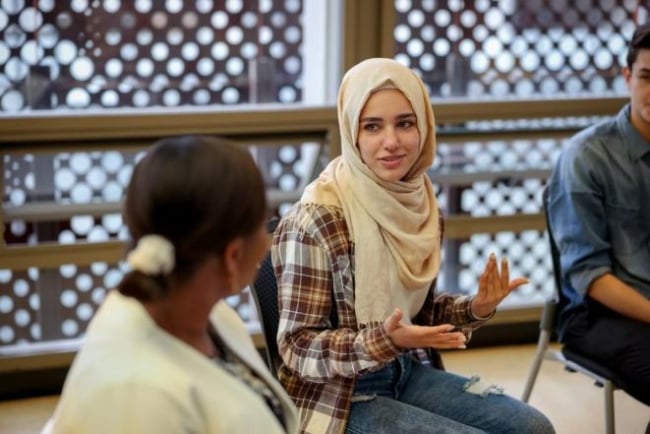You have /5 articles left.
Sign up for a free account or log in.

Students engage in religious, spiritual and interfaith activities on campus to build community and support their spiritual well-being.
Hispanolistic/E+/Getty Images
Creating student engagement and a healthy campus climate are frequently two goals for student affairs staff and campus leaders.
A 2012 study from the University of Iowa found positive connections between a student’s religious or spiritual affiliation and their well-being. Students who engage in religious activities and attend an institution with an inclusive religious climate had the highest association with well-being.
Inside Higher Ed found three examples of religious, spiritual or faith-based resources for students at colleges that support personal well-being, create community and, in turn, help set students up for success.
Navigating Higher Education Faith Resources
One organization created its own resource for students to find campuses with supportive facilities for religious and spiritual activities.
The INSPIRES—short for Interfaith, Spiritual, Religious and Secular Campus Climate—Index offers a five-point ranking of participating institution’s religious accommodations and space for support and expression.
Users can inspect each participating institution’s scorecard and see if it features meditation or prayer spaces, ritual washing stations, active student groups for spiritual practices and retreat opportunities, among other offerings.
Amherst College—kosher/halal kitchen, Muslim prayer room
Amherst College in Massachusetts hosts several spaces for religious and spiritual life activities on its campus. One is its Muslim prayer room, found in Morrow Hall behind the Frost Library.
The prayer room comes equipped with prayer rugs, headscarves and copies of the Quran for community members to use during their visit. The room is available 24-7 and the restroom attached to the room features supplies for wudu, or cleansing before prayer.
The Cardigan Center for Religious Life, found to the west of campus near the president’s house, is an interfaith facility with couches, a dining area and a TV. A notable feature is the building’s two kitchens, one for common use and the other for preparing kosher and halal meals.
Mount Holyoke—Eliot House
Mount Holyoke College has eight faith groups represented on its Massachusetts campus, each with its own chaplain or religious adviser who meets regularly with students. Its interfaith facility, Eliot House, is the office space for its community and belonging staff and hosts many of its regular faith-based events, like Shabbats, Jummah lunches, puja and more.
The house also has a Japanese meditation garden and teahouse on its rooftop. The teahouse—called Wa-Shin-An, which translates to “peace-mind house”—also offers tea ceremonies four times during the academic year.
University of Southern California—Hillel
The University of Southern California offers a center for its Jewish students through USC Hillel.
USC Hillel is committed to fostering the next generation of Jewish leaders and creates a safe space for students to explore their heritage, faith and culture. The group hosts Friday night Shabbat services and dinner, connects students with Birthright Israel, and each year offers a two-day retreat for incoming students to meet fellow Jewish Trojans.
One notable service of USC Hillel is its wellness initiatives and counseling services, which create a safe space for Jewish students to have identity-based support from staff and peers.
Does your campus support students’ spiritual well-being? Tell us about it.



